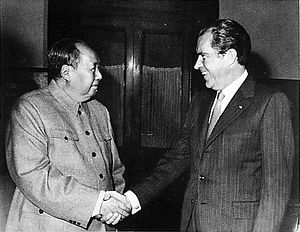Negotiators from the P5+1 and Iran will convene in Geneva tomorrow to try and reach an interim agreement on Tehran’s nuclear program after the last round unraveled at the last minute.
According to reports out this week, negotiators expect that one of the thorniest issues at the upcoming talks with be whether Iran has a right to enrich uranium domestically. Indeed, along with French intransigence, the issue that sank the last round of talks is said to have been Iran’s insistence that the P5+1 acknowledge its right to enrichment.
This is hardly a new demand; Iran has been insisting on this point for over a decade now. In Tehran’s view, it has an inherent right to enrichment as a signatory to the Nuclear Non-Proliferation Treaty (NPT). The P5+1 disagrees, with the group citing the U.N. Security Council resolutions against Iran’s nuclear program. The U.S., France, the U.K, and Israel also argue that the NPT does not grant non-nuclear weapon states (NNWS) a right to enrich uranium on their own soil.
Partly the issue hinges on the language of the NPT then. The relevant part of the Treaty is Article IV, which reads:
“1) Nothing in this Treaty shall be interpreted as affecting the inalienable right of all the Parties to the Treaty to develop research, production and use of nuclear energy for peaceful purposes without discrimination and in conformity with Articles I and II of this Treaty [which proscribe certain nuclear activities for non-nuclear weapon states].
2) All the Parties to the Treaty undertake to facilitate, and have the right to participate in, the fullest possible exchange of equipment, materials and scientific and technological information for the peaceful uses of nuclear energy.”
Iran thus insists that the NPT gives it the right to pursue peaceful nuclear activities, some of which require enriched uranium. The U.S. accepts that, so long as Iran or another NNWS are in compliance with their Treaty obligations, they have the right to participate in peaceful nuclear activities, but they deny that the Treaty gives them the right to enrich uranium themselves, rather than purchase it abroad. U.S. administrations predating the current one have made this argument based on the fact that the Treaty doesn’t explicitly give NNWS the right to enrich on their own soil.
In truth, Iran has the better argument here. The most fundamental principle of international law is that states must consent to give away the sovereign rights they have as a nation. The NPT doesn’t contain a clause in which the NNWS renounce domestic enrichment – in contrast to the article in which they renounce their right to pursue nuclear weapons. If states had a right to pursue nuclear weapons before becoming signatories to the NPT as NNWS, then it’s hard to argue that they didn’t similarly possess a right to enrich uranium. That’s why, as some astute observers note, at the time of the signing of the NPT, the U.S. side didn’t make this argument. In fact, U.S. officials said at the time: “Neither uranium enrichment nor the stockpiling of fissionable material in connection with a peaceful program would violate Article II [in which NNWS pledge not to seek nuclear weapons] so long as these activities were safeguarded under Article III.”
But this doesn’t put the two parties closer to reaching an interim deal. In truth, the Obama administration understands that it will at some point have to acknowledge Iran’s right to enrichment. However, it wants to do so only as part of a comprehensive final agreement. This is partly because it’s one more concession it wants to keep in its pocket, but also because it fears that if it acknowledges Iran’s right to enrich domestically as part of an interim deal, and then a final deal cannot be reached. Iran could use the language of the interim deal to justify its nuclear program moving forward.
There’s been a number of possible creative solutions devised in which the P5+1 would be implicitly acknowledging Iran’s right to enrich without actually saying as much. However, if the most recent reports are correct, this may not be enough for Iran’s Foreign Minister Javad Zarif and President Hassan Rouhani to sell an interim deal back home.
This seemingly intractable issue could have a readily available solution. Interestingly – given that many felt Obama should copy Richard Nixon’s example in engaging Iran – it comes from Nixon’s trip to Beijing to unofficially open up ties with Communist China.
At the Nixon-Mao meeting in 1972, the two sides signed the Shanghai Communiqué, which partly dealt with how to get around the Taiwan issue. The relevant part of the communiqué stated:
“The United States acknowledges that all Chinese on either side of the Taiwan Strait maintain there is but one China and that Taiwan is a part of China. The United States Government does not challenge that position.”
China took this to mean that the U.S. was acknowledging its sovereignty over Taiwan, which, to be fair, was likely exactly what Nixon intended it to mean. However, later U.S. administrations, finding circumstances had changed, offered a different interpretation of the statement cited above. As Andrew J. Nathan and Andrew Scobell explain: “U.S. negotiators later maintained that they had not ‘recognized’ (chengren) Chinese sovereignty over Taiwan but merely ‘acknowledged’ (renshi) the Chinese belief in this sovereignty.”
This seems like an adequate solution to the problem of Iran’s alleged right to enrich during an interim agreement. The interim agreement can state that the “P5+1 acknowledges that Iran maintains it has a right to enrich uranium domestically. The P5+1 does not challenge that position.” This would be strong enough language for Zarif and Rouhani to sell the agreement at home, while giving the P5+1 a way to protect itself in the case that a final agreement cannot be reached.

































